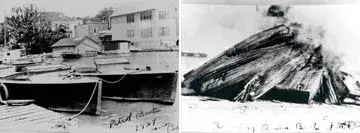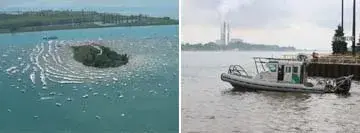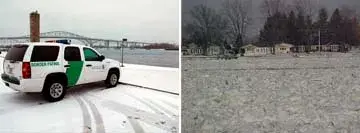
General Information
2600 Wills Road
Marysville, MI 48040
Phone: (810) 989-5056
Fax: (810) 364-9278

rum boats being burned in Marine City, MI.
History
Marysville Border Patrol Station (formerly the Port Huron Border Patrol Station), was first activated during the period from June to August 1924. This was in conjunction with the creation, pursuant to the Labor Appropriations Act of May 28, 1924, of the new Border Patrol sub-sector with its headquarters at Marine City, Michigan. The need for the sector, and Port Huron Station in particular, became increasingly apparent after the passage of the 18th Amendment creating Prohibition. Liquor smuggling in the area was rampant and closely associated with a mounting volume of alien smuggling. Rumrunners were staging barges, stocked with future supplies of contraband liquor for the United States, along the Canadian shore of the St. Clair River.
The station was located in an office of the Grand Trunk Railroad Terminal near the mouth of the Sarnia-Port Huron Railroad Tunnel until mid-1960. In October 1960, the station was moved to 2112 River Road in Marysville. Finally, in October 2007, the station was relocated to 2600 Wills Road in Marysville and renamed the Marysville Border Patrol Station.

(Right Image): Marysville agents conducting marine
patrol on the station SAFE boat.
Area of Responsibility
The international border in the Marysville area is a water boundary made up of the St. Clair River connecting to Lake Huron to the north and Lake St. Clair to the south. The waterways are major shipping channels in the Great Lakes System and are easily navigated throughout most of the year. The station's geographic area of responsibility consists of 19 Michigan counties, and is predominantly rural outside of the Marysville/Port Huron area. The Blue Water Bridge, as well as a freight train tunnel that runs under the St. Clair River, are located within the station's patrol area.
The Marysville Station is located near the relatively narrow St. Clair River that, in places, separates the United States and Canada by only a few hundred yards. A major focus of Marysville Station's operations is marine patrol on the St. Clair River during the busy boating season. During the winter months the river and lake freeze, and agents patrol the shoreline to prevent foot or snowmobile crossings.

Blue Water Bridge. (Right Image): Looking across
the frozen St. Clair River to Canada.
.

